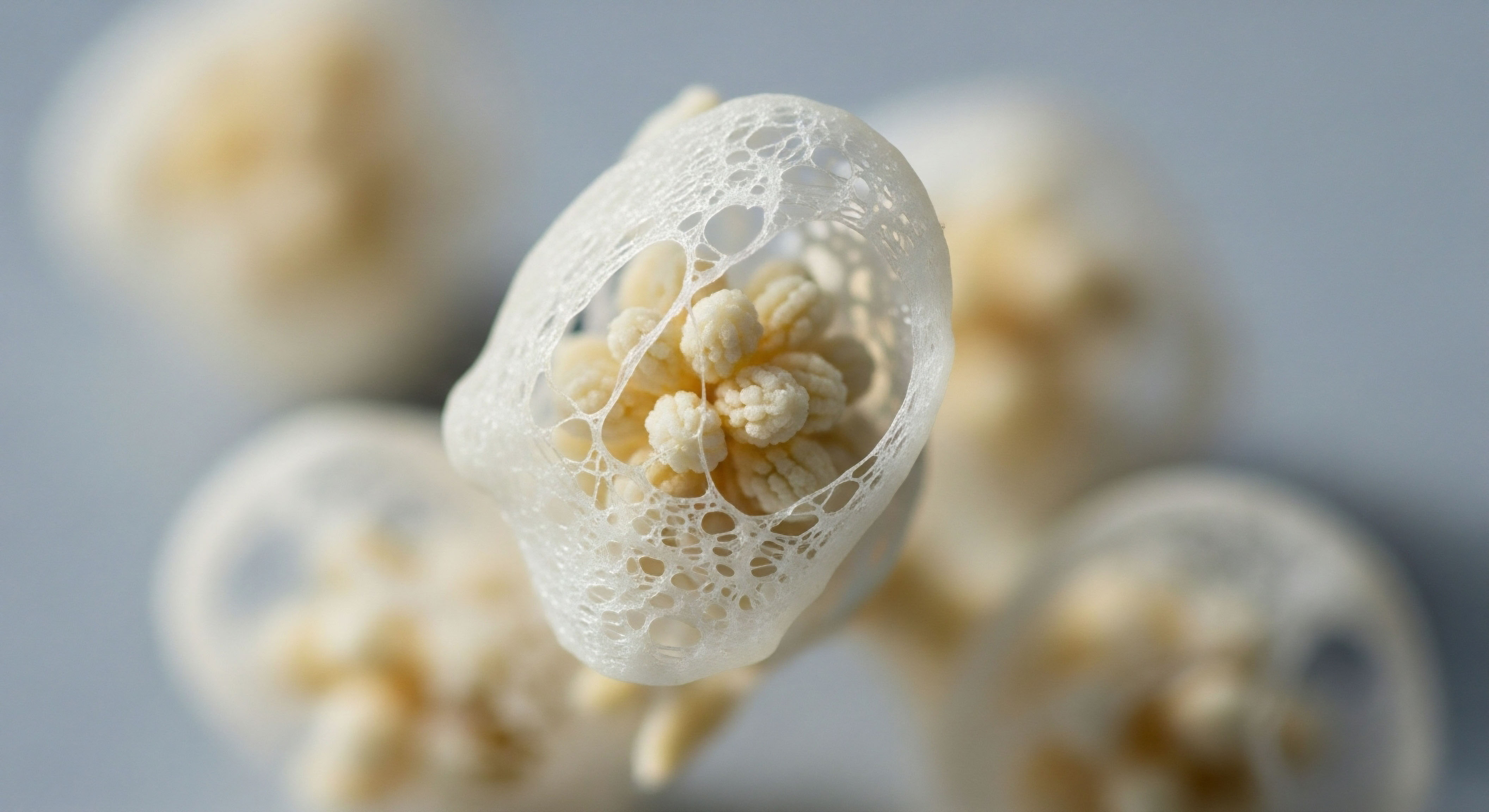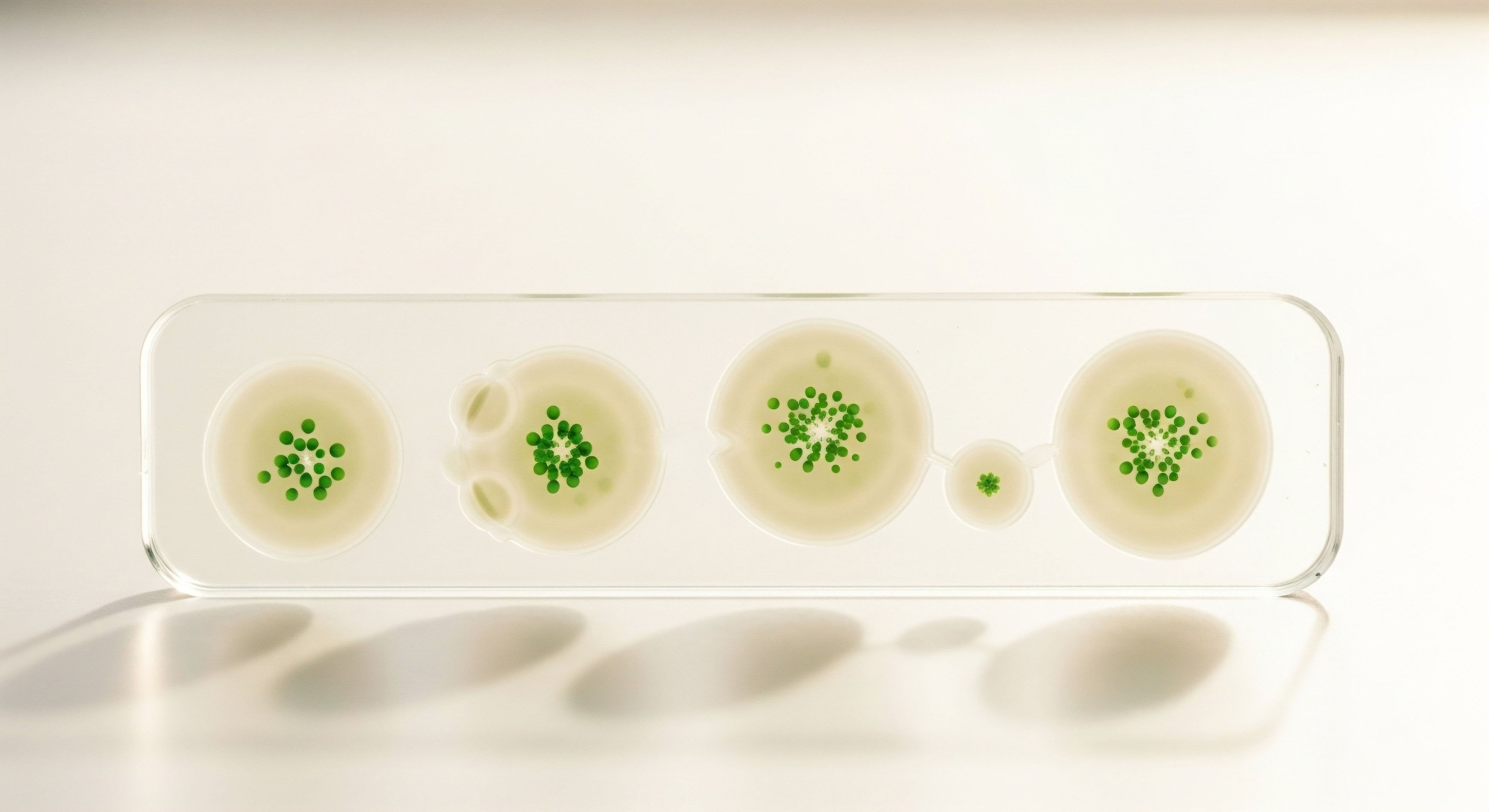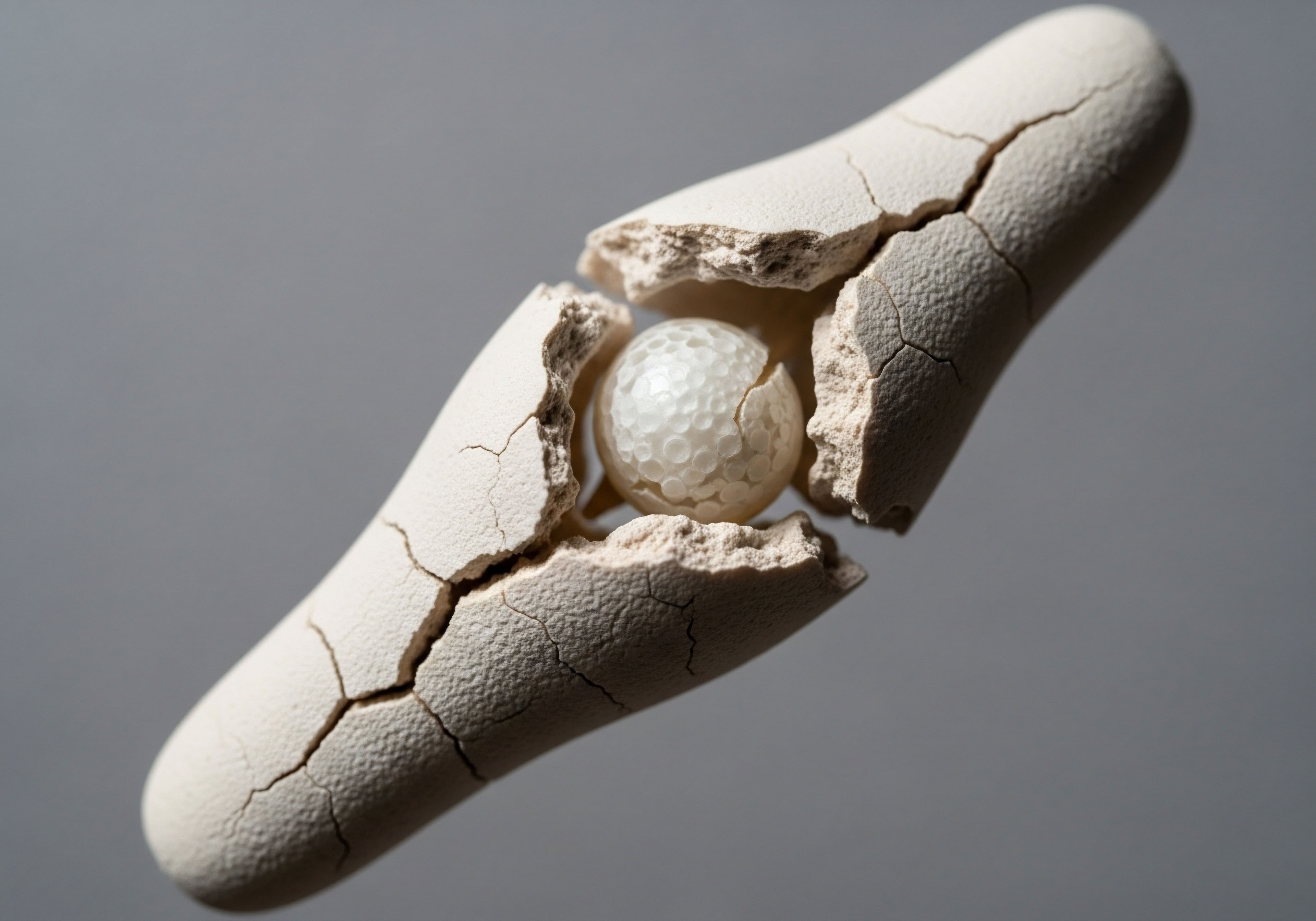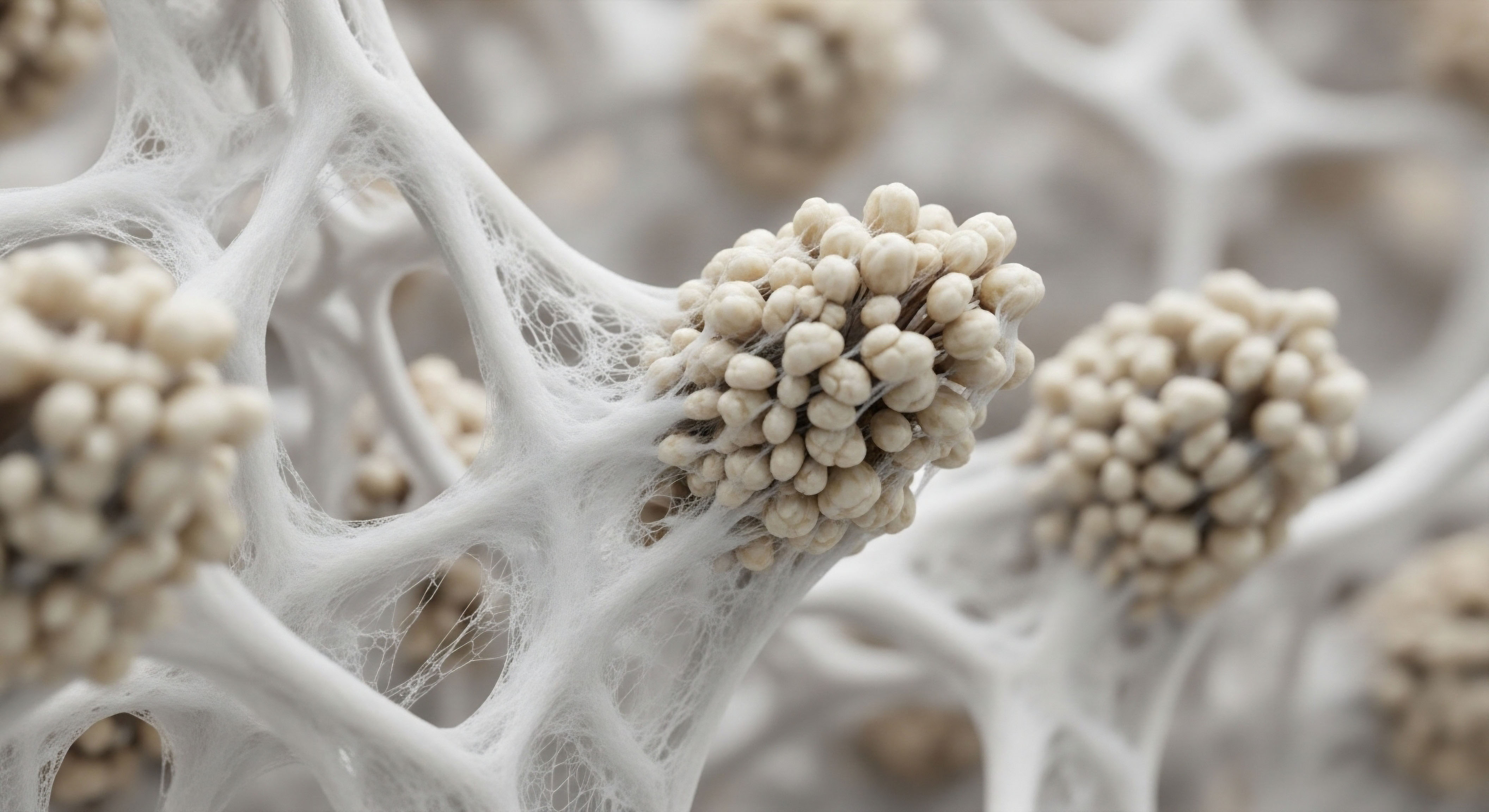

Fundamentals
You feel it as a subtle shift in your internal landscape. A change in energy, a decline in vitality, a sense that your body’s operational capacity is somehow diminished. This experience, so common in the journey of aging, often leads to an investigation of your hormonal health, and specifically, to testosterone levels.
When you begin a protocol of testosterone replacement therapy (TRT), you are taking a direct, decisive step to restore a critical signaling molecule in your body. This is a powerful and scientifically validated intervention. Yet, the outcomes of this therapy, your individual response to it, are shaped by a vast, complex, and dynamic ecosystem residing within you ∞ your gut microbiome.
The community of trillions of microorganisms lining your digestive tract is a central command center for your health. This internal world communicates with every other system in your body, including your endocrine system, through a constant stream of biochemical messages. This specific line of communication between your gut and your gonads is known as the gut-gonadal axis.
It is a bidirectional highway. The health and composition of your gut bacteria can influence the production and activity of testosterone. In turn, your circulating testosterone levels can shape the environment of your gut, favoring the growth of certain microbial species over others. Understanding this relationship is foundational to optimizing your hormonal health journey.
Your gut microbiome functions as a dynamic, responsive organ that actively participates in regulating your hormonal balance.

The Gut as a Metabolic Engine
Think of your gut microbiome as a sophisticated metabolic engine. It does far more than simply aid in the digestion of food. It synthesizes essential vitamins, metabolizes compounds that your own cells cannot, and produces a vast array of signaling molecules that travel throughout your body.
Among these are short-chain fatty acids (SCFAs), such as butyrate, which are produced when gut bacteria ferment dietary fiber. These molecules are fuel for the cells lining your colon, and they also act as potent messengers that can influence inflammation, immune function, and even the activity of the hypothalamic-pituitary-gonadal (HPG) axis, the master control system for hormone production.
A state of imbalance in this microbial community, often called dysbiosis, can disrupt these critical functions. Dysbiosis can arise from a number of factors, including a diet low in fiber, chronic stress, or the use of certain medications.
When the gut environment is compromised, it can lead to increased intestinal permeability, a condition sometimes referred to as “leaky gut.” This allows inflammatory molecules, such as lipopolysaccharides (LPS), to enter the bloodstream, triggering a low-grade, systemic inflammatory response. This chronic inflammation is a significant stressor on the body and can directly impair the function of the Leydig cells in the testes, which are responsible for producing testosterone.

What Is the Role of Probiotics in This System?
Probiotics are live microorganisms that, when administered in adequate amounts, confer a health benefit on the host. They are a tool for directly influencing the composition and function of the gut microbiome. By introducing specific beneficial strains of bacteria, such as those from the Lactobacillus and Bifidobacterium families, you can help to restore balance to a dysbiotic gut. These beneficial microbes can outcompete less desirable species, strengthen the gut barrier, and modulate the immune system, thereby reducing systemic inflammation.
The introduction of probiotics into your wellness protocol is an act of cultivating your internal ecosystem. It is a recognition that your hormonal health is not determined by a single molecule in isolation, but is instead a reflection of the health of your entire biological system.
As you embark on a journey of biochemical recalibration with TRT, supporting the health of your gut microbiome is a parallel and synergistic action. It prepares the physiological environment to receive and utilize therapeutic testosterone most effectively, creating a foundation for a more robust and sustained positive outcome.


Intermediate
For the man on a structured Testosterone Replacement Therapy protocol, the weekly administration of Testosterone Cypionate, often complemented by Gonadorelin and an aromatase inhibitor like Anastrozole, represents a precise, data-driven approach to restoring physiological function. You monitor your blood levels, track your symptoms, and adjust dosages to achieve a state of optimization.
Within this clinical framework, the gut microbiome presents itself as a key variable that can significantly influence the efficiency and success of your protocol. The interaction is not merely theoretical; it is a tangible biochemical process that occurs at the intersection of endocrinology and microbiology.
The community of microbes in your gut that specifically metabolizes androgens can be thought of as the “androbolome.” This is a functional subset of your microbiome that directly engages with testosterone and its metabolites. One of the key actions of these bacteria is the production of an enzyme called beta-glucuronidase.
In the liver, hormones like testosterone are conjugated, or “packaged,” with a glucuronide molecule to prepare them for excretion. When these conjugated hormones reach the gut, certain bacteria can produce beta-glucuronidase, which cleaves off the glucuronide molecule. This process, known as deconjugation, effectively reactivates the hormone, allowing it to be reabsorbed into circulation.
A healthy, diverse microbiome with a robust capacity for this process can thus increase the bioavailability of both endogenous and exogenous testosterone, potentially enhancing the effects of your TRT.
The composition of your gut microbiome can directly affect the circulating levels of active testosterone in your body by modifying how it is metabolized and reabsorbed.

Probiotic Strains and Their Potential Mechanisms
When considering the addition of probiotics to a hormonal optimization protocol, it is helpful to move beyond a general recommendation and look at the specific actions of different strains. While research is ongoing, particularly in humans, animal studies and mechanistic data point to several promising candidates. The goal is to select strains that support the gut barrier, reduce inflammation, and positively modulate the gut-gonadal axis.
Here is a breakdown of some relevant probiotic species and their observed effects:
- Lactobacillus reuteri ∞ This is one of the most studied strains in the context of male hormonal health. Animal studies have shown that supplementation with L. reuteri can prevent age-related testicular atrophy, increase Leydig cell numbers, and raise serum testosterone levels in mice. The proposed mechanism is a reduction in systemic inflammation, particularly by modulating the pro-inflammatory cytokine Interleukin-17A. While a recent human trial did not replicate the testosterone-boosting effect, the anti-inflammatory properties of this strain remain a compelling reason for its consideration.
- Bifidobacterium longum ∞ This species is a well-regarded probiotic for its ability to support gut barrier integrity and produce beneficial short-chain fatty acids (SCFAs). By strengthening the junctions between intestinal cells, B. longum can help to reduce the translocation of inflammatory lipopolysaccharides (LPS) into the bloodstream. Lowering the body’s inflammatory burden can create a more favorable environment for testicular function and hormonal balance.
- Lactobacillus casei ∞ Known for its immunomodulatory effects, L. casei can help to balance the immune response in the gut. This can contribute to a reduction in the chronic, low-grade inflammation that is known to suppress testosterone production. It also supports a healthy gut environment that is less hospitable to pathogenic bacteria.

How Does Probiotic Supplementation Affect TRT Outcomes?
Integrating probiotics into a TRT regimen is about optimizing the internal environment to support the therapy’s goals. The mechanisms are multifaceted and synergistic. By reducing systemic inflammation, probiotics can alleviate a key suppressor of testicular function. For men using Gonadorelin to maintain natural testosterone production alongside TRT, this can be particularly beneficial. A less inflamed internal environment allows the Leydig cells to respond more efficiently to the signaling from Luteinizing Hormone (LH), which Gonadorelin mimics.
Furthermore, by modulating the androbolome, probiotics can influence the metabolism of testosterone and its conversion to other androgens like Dihydrotestosterone (DHT). Research has shown that the gut microbiome is a major regulator of androgen metabolism, capable of producing high levels of free DHT in the colon. By supporting a healthy microbial community, you may be ensuring a more efficient utilization of the testosterone you are administering, leading to better clinical outcomes in terms of muscle mass, energy levels, and libido.
The following table outlines the potential synergistic effects of probiotics when combined with a standard male hormone optimization protocol:
| TRT Protocol Component | Probiotic Mechanism of Action | Potential Synergistic Outcome |
|---|---|---|
| Testosterone Cypionate | Enhanced deconjugation by gut bacteria (androbolome) | Increased bioavailability of active testosterone |
| Gonadorelin | Reduction of systemic and testicular inflammation | Improved Leydig cell response and natural testosterone production |
| Anastrozole | Modulation of the estrobolome (gut bacteria that metabolize estrogen) | More stable estrogen balance and reduced need for high doses of aromatase inhibitors |


Academic
From a systems-biology perspective, the efficacy of Testosterone Replacement Therapy is contingent upon a network of interconnected physiological pathways. While the administration of exogenous testosterone directly addresses a hormonal deficiency, its ultimate clinical expression is modulated by downstream metabolic and inflammatory processes, many of which are orchestrated by the gut microbiome.
A deep exploration of this interaction requires an examination of the molecular signaling cascades that link the microbial ecosystem of the gut to the endocrine function of the gonads. This is the domain of the gut-gonadal axis, a complex regulatory system with profound implications for men undergoing hormonal optimization.
The conversation begins with the metabolic byproducts of microbial fermentation, specifically short-chain fatty acids (SCFAs) like butyrate, propionate, and acetate. These molecules are not merely waste products; they are potent signaling molecules that function as epigenetic modifiers and ligands for G-protein coupled receptors (GPCRs) throughout the body.
For instance, butyrate is a known histone deacetylase (HDAC) inhibitor, meaning it can alter gene expression. In the context of the gut-gonadal axis, SCFAs produced by a healthy microbiome can influence the hypothalamic-pituitary-gonadal (HPG) axis. They signal to the enteroendocrine cells of the gut, which in turn release peptides like Peptide YY (PYY) and Glucagon-like peptide-1 (GLP-1).
These gut hormones can cross the blood-brain barrier and modulate the release of Gonadotropin-releasing hormone (GnRH) from the hypothalamus, thereby influencing the entire downstream hormonal cascade, including the production of LH and testosterone.
The molecular dialogue between gut microbes and the male endocrine system involves intricate signaling pathways that can dictate the overall success of hormonal therapies.

Inflammation and Leydig Cell Dysfunction
A critical mechanism through which the gut microbiome impacts testosterone production is the modulation of systemic inflammation. The outer membrane of Gram-negative bacteria contains lipopolysaccharides (LPS), a potent endotoxin. In a state of gut dysbiosis and increased intestinal permeability, LPS can translocate from the gut lumen into systemic circulation, leading to a condition known as metabolic endotoxemia. This triggers a chronic, low-grade inflammatory state mediated by the activation of Toll-like receptor 4 (TLR4) on immune cells.
The Leydig cells of the testes are particularly sensitive to this inflammatory signaling. The binding of LPS to TLR4 on Leydig cells initiates an intracellular signaling cascade that inhibits the expression of key steroidogenic enzymes, including Cytochrome P450scc (side-chain cleavage enzyme) and 3β-hydroxysteroid dehydrogenase (3β-HSD).
These enzymes are essential for the conversion of cholesterol into testosterone. Consequently, a state of chronic inflammation originating from gut dysbiosis can directly suppress the steroidogenic capacity of the testes. Probiotic interventions, particularly with strains known to reinforce the gut barrier and downregulate inflammatory pathways, can mitigate this LPS-induced suppression, thereby creating a more permissive environment for both endogenous and exogenous testosterone to function.

The Androbolome and Steroid Deconjugation
The concept of the “androbolome” extends our understanding of androgen metabolism beyond the liver and target tissues. It posits that the gut is a significant site of androgen processing. The liver conjugates androgens with glucuronic acid to facilitate their excretion. However, bacterial species in the gut, particularly from the Clostridium and Bacteroides genera, produce beta-glucuronidase, an enzyme that reverses this process. This deconjugation liberates free, active androgens like testosterone and DHT, allowing for their reabsorption into the enterohepatic circulation.
Research using germ-free mice has provided compelling evidence for this mechanism. These mice, lacking a gut microbiome, exhibit significantly lower levels of free DHT in their distal intestine compared to their conventional counterparts. This demonstrates that the gut microbiota is a critical regulator of androgen availability in the body.
For an individual on TRT, a healthy and diverse microbiome with robust beta-glucuronidase activity could theoretically increase the half-life and potency of administered testosterone. Conversely, a depleted microbiome may lead to a more rapid clearance of androgens, potentially diminishing the clinical response to a given dose of TRT. Probiotic supplementation can be viewed as a strategy to cultivate a microbiome that is rich in these key enzymatic functions.
The following table summarizes key research findings on the interaction between the gut microbiome and androgen metabolism, providing a basis for the clinical application of probiotics in the context of TRT.
| Study Focus | Key Findings | Implication for TRT Protocols |
|---|---|---|
| Gut Microbiota and Androgen Metabolism in Mice (Colldén et al. 2019) | Germ-free mice have lower levels of free DHT in the distal intestine. The gut microbiota is essential for the deconjugation of androgens. | A healthy microbiome may increase the bioavailability of administered testosterone and its conversion to DHT. |
| Lactobacillus reuteri and Testicular Function in Mice (Poutahidis et al. 2014) | L. reuteri supplementation increased serum testosterone, Leydig cell number, and prevented age-related testicular atrophy, likely via anti-inflammatory mechanisms. | Probiotic strains with anti-inflammatory properties may protect testicular function and enhance the body’s response to hormonal support like Gonadorelin. |
| Gut-Brain Axis and Hormone Regulation (V. lactis V9 study) | Probiotics can modulate gut-brain mediators like PYY and ghrelin, which in turn influence sex hormone levels via the HPG axis. | The effects of probiotics on hormonal health are systemic, involving complex neuroendocrine feedback loops. |
| Human Trial of L. reuteri in Men (Nilsson et al. 2024) | Supplementation with L. reuteri did not significantly increase testosterone levels in healthy middle-aged men. | Translating findings from animal models to human clinical practice requires further research to determine optimal strains, dosages, and target populations. |

References
- Poutahidis, Theofilos, et al. “Probiotic microbes sustain youthful serum testosterone levels and testicular size in aging mice.” PLoS One, vol. 9, no. 1, 2014, e84877.
- Colldén, H. et al. “The gut microbiota is a major regulator of androgen metabolism in intestinal contents.” American Journal of Physiology-Endocrinology and Metabolism, vol. 317, no. 6, 2019, pp. E1182-E1192.
- He, S. et al. “Gut Microbiome ∞ A Potential Controller of Androgen-Modulated Disease.” Iris Journal of Nursing & Care, vol. 2, no. 2, 2021.
- Adekunle, A. et al. “Gut microbiota-gonadal axis ∞ the impact of gut microbiota on reproductive functions.” Reproductive Biology and Endocrinology, vol. 21, no. 1, 2023, p. 77.
- He, B. et al. “Probiotic Bifidobacterium lactis V9 regulates the secretion of sex hormones in polycystic ovary syndrome patients through the gut-brain axis.” mSystems, vol. 6, no. 6, 2021, e00971-21.
- Nilsson, A. G. et al. “Effects of probiotic supplementation on testosterone levels in healthy ageing men.” Journal of Human Nutrition and Dietetics, 2024.
- Markowiak-Kopeć, Paulina, and Katarzyna Śliżewska. “The Effect of Probiotics on the Production of Short-Chain Fatty Acids by Human Intestinal Microbiome.” Nutrients, vol. 12, no. 4, 2020, p. 1107.
- Qi, Y. et al. “The gut microbiome and sex hormone-related diseases.” Frontiers in Immunology, vol. 12, 2021, p. 711137.

Reflection
You have now explored the intricate biological connection between the microbial world within you and the hormonal signals that define so much of your physiological function. This knowledge shifts the perspective on your health journey. The numbers on your lab report are data points, but they are reflections of a much larger, more dynamic system.
Your body is not a machine with separate, isolated parts. It is an integrated ecosystem, where the health of one system profoundly influences the function of another.
As you move forward with your personalized wellness protocol, consider this new dimension. The choices you make every day ∞ the food you eat, the way you manage stress, the quality of your sleep ∞ are all inputs that shape your internal microbial community. This community, in turn, is a silent partner in your hormonal health.
The path to sustained vitality is one of continuous learning and recalibration. The information presented here is a map, designed to help you understand the terrain. The next step is to apply this understanding to your own unique biology, in partnership with guidance that recognizes the profound interconnectedness of your internal world.



